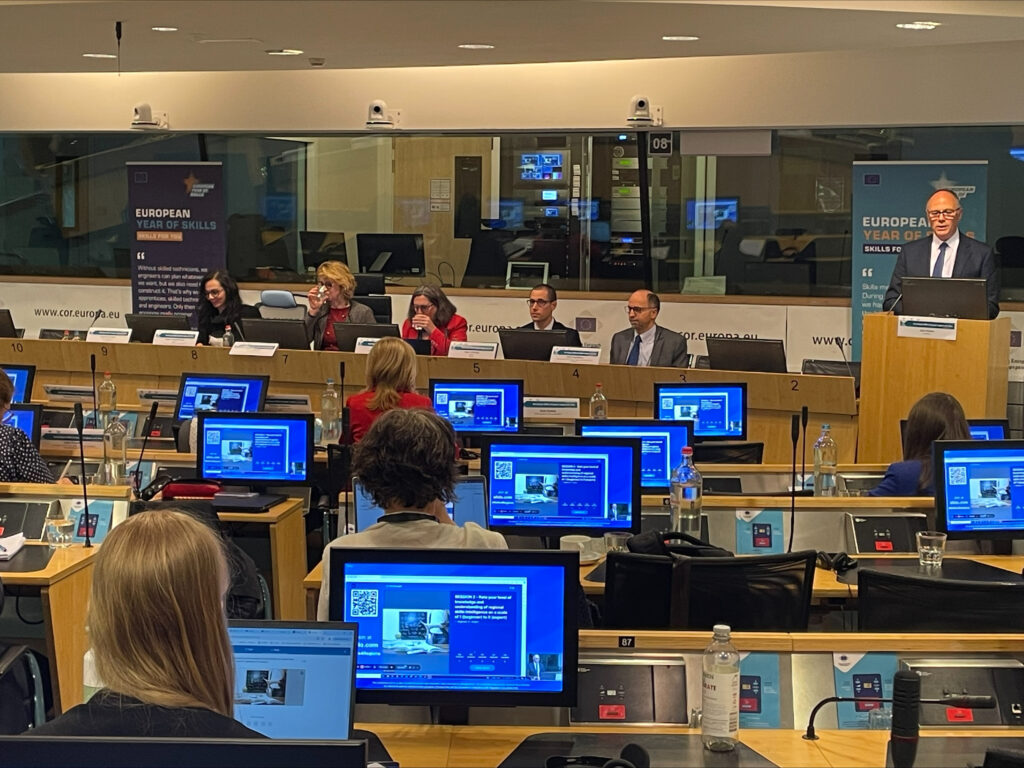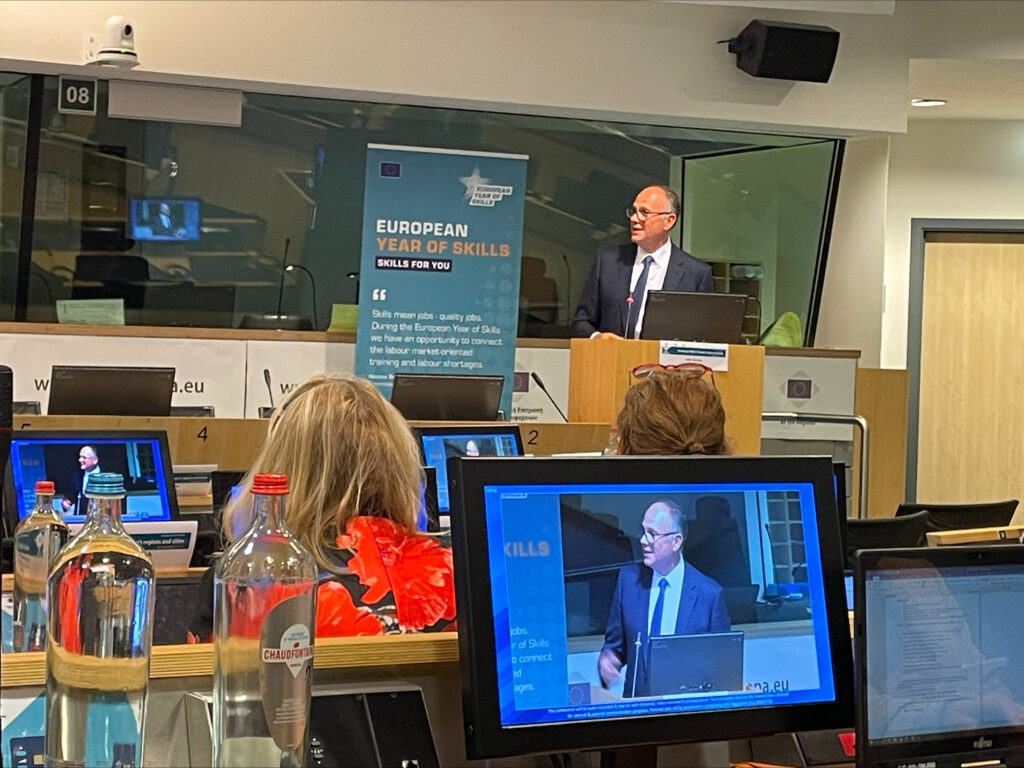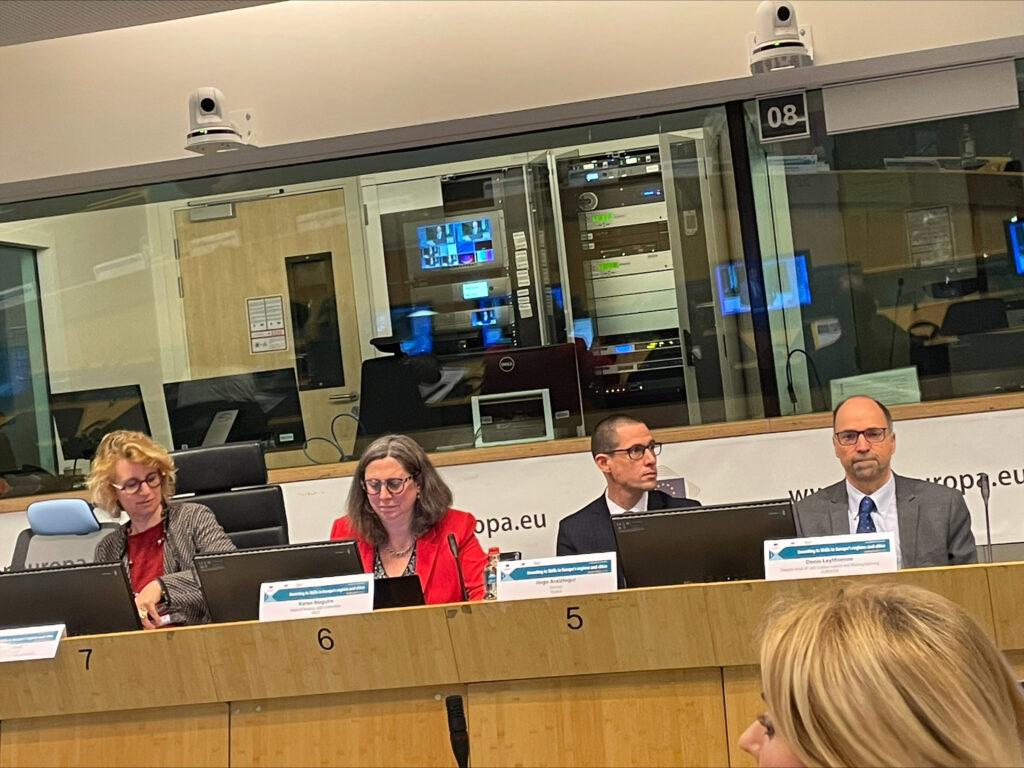Investing in Skills in Europe’s Regions and Cities
26/04/2024

On 25 April 2024, the European Committee of the Regions (CoR) and the European Commission, DG for Employment, Social Affairs and Inclusion (DG EMPL) co-organised the event “Investing in Skills in Europe’s Regions and Cities’‘. This conference marked the closing of the European Year of Skills at the Committee of the Regions. The event was divided into three sessions focused on the critical role of skills development and the transformative power of upskilling and reskilling in bolstering the socio-economic fabric of Europe’s diverse regions and cities. Mr Iñigo Araiztegui, Director of the Internationalisation Department of TKNIKA, was invited to introduce LCAMP: Learner Centric Advanced Manufacturing Platform for Centres of Vocational Excellence (CoVEs) Skills and Jobs Observatory findings, a project in which EARLALL is participating.
The “Investing in Skills in Europe’s Regions and Cities” was opened by Ms Tanya Hristova, Mayor of Gabrovo (Bulgaria) and Chair of the SEDEC Commission at the Committee of the Regions. She explained that the SEDEC Commission is working with the DG for Employment, Social Affairs and Inclusion (DG EMPL) to address the societal challenges and reach a skilled, resilient and inclusive workforce. Mr Vasco Alves Cordeiro (President of the CoR), Ms Andriana Sukova (Acting Director General DG Employment, Social Affairs, European Commission) and Mr Dragoş Pîslaru (Member of the European Parliament) agreed that the European Year of Skills has been a flagship initiative that needs to continue further. Mr João Santos, Expert in education and training stressed that “we need to see skills as an investment and not as an expenditure.”
The opening was followed by three-panel discussions focusing on upskilling and reskilling, regional skills intelligence and private-public partnerships at the local and regional levels.
The first session counted the contributions from the four commissions of the Committee of the Regions on the European Year of Skills. Mr Santos set up the scene by stressing the disparities in the provision of Lifelong Learning opportunities among different regions and countries. He stressed that there is a difference of up to 30 times more between the region that provides more educational opportunities and the region that provides less or none. Public authorities can contribute to filling the gap. Ms Hristova said that local authorities have the role to mobilise funding, to bring all the stakeholders together and to build a strategy to deliver training. She added that we need a respectable lifelong learning programme. Her colleague, Ms Feeney (Dun Laoghaire Rathdown County Council, Ireland), added that re- and upskilling can boost economic growth, but for that needed specialised skills that follow the speed of the twin transition and brought on board SMEs. The attraction of skills and talent to the EU from third countries is also essential as highlighted by Mr Varacalli (Member of Gerace Municipal Council, Italy). Inclusion, integration of migrants and training the trainers were mentioned as possible solutions to tackle skills shortages.
The second session deep-dived into the skills of intelligence and the importance of data collection to identify skills gaps and trends. Representatives from OECD, Public Services Network, Cedefop and Eurostat stressed that skills intelligence can play a pivotal role in addressing labour market challenges. However, they all agreed that is difficult to collect data and then understand how to interpret and value it at the local level. Mr Francois Decoster (Committee of the Regions) stated that a macro-regional level cooperation will be essential to overcome those difficulties. LCAMP, Skills and Jobs Observatory has been working on the skills of intelligence for the past months. Mr Iñigo Araiztegui introduced the main findings of the Observatory, such as that the jobs in the Advanced Manufacturing sector won’t change but the skills required for each position will evolve, green skills and circular economy concepts must be included in all training programmes, Lifelong Learning culture needs to be strengthened, basic technical skills are essential.


The third session looked at how to build private-public partnerships for upskilling and reskilling at the local and regional levels to understand the skills intelligence to ensure that they have the skills that are needed. One good example is the European initiative “Pact for Skills” which aims to get public and private organisations together and encourage them to make concrete commitments to upskilling and reskilling adults. Another excellent example is the Centers of Vocational Excellence Platforms (CoVEs), as mentioned by Mr Pieter Moerman, Director of Platform Talent for Technology and one of the founders of the Katapult network, CoVE. The CoVEs are networks of partners that develop local “skills ecosystems” to provide high-quality vocational skills to young people and adults and contribute to regional development, innovation, industrial clusters, smart specialisation strategies and social inclusion. As Mr João Santos explained the CoVEs that are successful in creating their skills ecosystems bringing together public-private actors should continue their work beyond the public funding. Therefore, going expanding even with new partners, new countries and so broadening training opportunities. Mr Moerman added that making the CoVEs more inclusive is essential for the next steps, but also support the Community of Practices, so Centers can continue sharing information and supporting each other.
Mr Thomas Wobben, Director for Legislative Works, European Committee of the Regions and Ms Manuela Geleng, Director of Jobs and Skills, DG EMPL, DG Employment, Social Affairs, European Commission, was invited to look into the future actions to advance the European Year of Skills further form this year. Mr Wobben stated that we need “willingness to learn, to invest and to support people. At the European level, this is reflected by supporting with funds, cohesion funds which support places and Erasmus+ which supports people training. Ms Geleng thanked public authorities for bringing the European Year of Skills closer to the citizens. She added that to keep going with this work, all the stakeholders are needed on board and that initiatives such as the Pact for Skills and the CoVEs are excellent. She concluded by saying that the future of our society is at stake, and that’s why “skills, skills, skills” must continue to be present after the end of this year.




